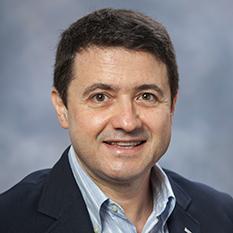In order to cope with the vast amount of data and processing requirements of distributed intelligence services novel synergies between networking and AI need to be leveraged; I will present several recent results in that area. First we look into the joint optimization of service placement and request routing in dense multi-cell wireless networks. The storage requirements of the different services as well as the processing and communication requirements of the service requests are considered. An algorithm that achieves close-to-optimal performance using a randomized rounding technique is presented. Chains of virtual network functions are considered then and allocation algorithms that comply to the related precedence constraints are presented. Federated learning is considered then as a representative AI service at the network edge. An algorithm that addresses the heterogeneity of the different clients is presented towards providing unbiased services. Then we look into the issue of limited network resources for training as well as the asymmetric access profiles of the different clients and provide an algorithm for client selection to mitigate the effect of asymmetries. Finally we will present some recent results on combining graph Neural Networks (NN) and transformers for spatio-temporal networks predictions and optimization.

Leandros Tassiulas is the John C. Malone Professor of Electrical Engineering at Yale University, where he served as department head 2016-2022. His current research is on intelligent services and architectures at the edge of next generation networks including Internet of Things, sensing & actuation in terrestrial and non terrestrial environments and quantum networks. He worked in the field of computer and communication networks with emphasis on fundamental mathematical models and algorithms of complex networks, wireless systems and sensor networks. His most notable contributions include the max-weight scheduling algorithm and the back-pressure network control policy, opportunistic scheduling in wireless, the maximum lifetime approach for wireless network energy management, and the consideration of joint access control and antenna transmission management in multiple antenna wireless systems. Dr. Tassiulas is a Fellow of IEEE (2007) and of ACM (2020) as well as a member of Academia Europaea (2023). His research has been recognized by several awards including the IEEE Koji Kobayashi computer and communications award (2016), the ACM SIGMETRICS achievement award 2020, the inaugural INFOCOM 2007 Achievement Award “for fundamental contributions to resource allocation in communication networks,” several best paper awards including the INFOCOM 1994, 2017 and Mobihoc 2016, a National Science Foundation (NSF) Research Initiation Award (1992), an NSF CAREER Award (1995), an Office of Naval Research Young Investigator Award (1997) and a Bodossaki Foundation award (1999). He holds a Ph.D. in Electrical Engineering from the University of Maryland, College Park (1991) and a Diploma of Electrical Engineering from Aristotle University of Thessaloniki, Greece. He has held faculty positions at Polytechnic University, New York, University of Maryland, College Park and University of Thessaly, Greece.


